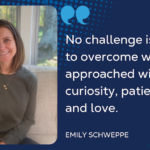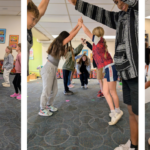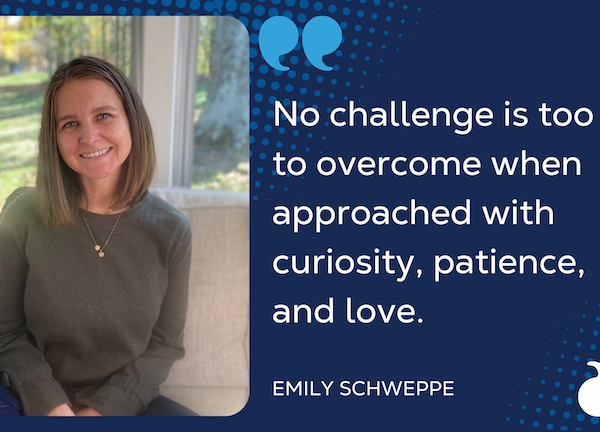
No Challenge is Too Big: Support is Available for Parents
March 17, 2025
Building Belong Through Movement in Music
March 28, 2025
It happens occasionally that a learning disability story makes an appearance outside of trade press, and when it does, it always catches my attention. This week one title caught my eye: "A Dyslexic Comedian Walks Into a Recording Booth."

In the piece, Comedian Phil Hanley opened up to Reporter Elisabeth Eagen from the New York Times about his recent memoir, “Spellbound: My Life as a Dyslexic Wordsmith.” What he shares with her will shock many readers but resonates in the Springer community because it echoes what we have witnessed during our fifty-plus years walking alongside students with dyslexia and their families.
Journalist Elisabeth Eagen writes:
While classmates learned to write, read and spell, Hanley drew lines and shapes that never quite made sense to himself or anyone else. He couldn’t sound out words, couldn’t match a letter with a sound. Letters were a chaotic jumble; a block of text might as well have been an abstract painting. Hanley’s teacher announced the creation of a special one-student spelling group, “because Philip can’t keep up.” She also shouted, “Philip, you can’t do anything right!”
Hanley only made it to second grade because his mother, a former teacher, insisted. He still didn’t know how to read, and he wouldn’t learn for a long time.
Thus commenced a decade of shame, humiliation and running out the clock on his own schooling. When Hanley was diagnosed with severe dyslexia at age 10, there was no customized curriculum or individualized learning plan. He was placed in a special education classroom alongside students whose myriad needs were addressed with a “one size fits all” approach. He spent one semester memorizing Christmas carols, another weaving a single place mat. He entertained himself — and others — by cracking jokes.
Hanley remembers this period in black and white, with color flowing in around summer vacations. His mother hid back-to-school circulars because she knew they would upset him. She volunteered at the school library to make sure he was receiving fair treatment.
At Springer, these stories reflect a theme we frequently encounter. Unfortunately, similar experiences are sill shared by families striving to support their own children.
Hanley never expected to intentionally confront his greatest challenge with this level of immersion by writing a book, and then voicing the audio book.
When a literary agent broached the subject of a memoir, it was Hanley’s turn to laugh. He thought the idea sounded “insane,” like the worst “Shark Tank” pitch ever. His war with words hadn’t ended at graduation: He still struggles to read a menu, address an envelope and make sense of names he hasn’t memorized.
“Fundamental things that make functioning as a human easy, I lack those,” he said.
But Hanley was haunted by the questions he’d fielded once, at an event hosted by a nonprofit that supports neurodiverse students. After his set, several young people asked, in effect, how are you not ashamed of being dyslexic?
“Do you feel shame if you’re diabetic or have epilepsy?” Hanley said. “We have these challenges in life, but on top of that you’re going to feel shame?”
Hanley has come to think of dyslexia as a gift, one that spurred him to be creative and quick on his feet, to solve problems and connect with people. He even credits dyslexia for his move to New York City, where he finds the numbered streets easier to navigate.
Of course, it’s also ripe for comedy.
“I arrived in first grade, everyone started reading,” Hanley said on “The Tonight Show.” “I was like, ‘Meh, I’m gonna stare out the window for a decade. But you guys, you do your thing.”
He went on, “Tell a dyslexic child to sound it out? That’d be like if someone pulled you aside and said, ‘Hey, I can’t eat this, I’m deathly allergic to peanuts,’ and you’re like, ‘Chew slowly.’”
Hanley continues with reporter Elisabeth Eagen to talk about the support and confidence his mother provided him during childhood. She writes:
He hopes parents will hear this message in his book, which came out this week: “The qualities that you want to instill, you’ll have those by the end of first grade if your kid is dyslexic,” he said. “They’ll have character, tenacity, determination. They’ll have the grit of someone who’s been through two divorces.”
As if delivering his favorite punchline, Hanley added, “Just maintain their self esteem.”
People sometimes forget that individuals with dyslexia can and do achieve great things, especially when given support and tools to manage the challenge. With the hindsight of a completed novel and accompanying audio book, Phil Hanley told the reporter:
“It was cathartic,” Hanley said. “It was hard. But I’m used to things being hard.”
Stories like this illustrate the importance of Springer’s mission to empower students in school and also demonstrates why we carry that mission beyond our school and into the community to educate parents and teachers, and to support children and families in many important ways on their educational journeys.
Read the full article here, also available, free, via the Cincinnati Public Library
Sara McDulin
Communications Director, Springer School and Center



